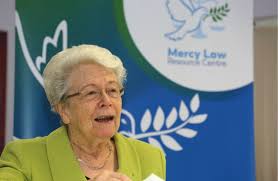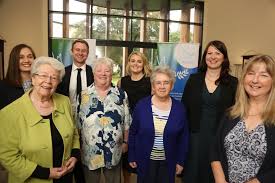By Sarah MacDonald on October 29th, 2020[Sarah Mac Donald is a freelance journalist based in Dublin.]
First published in Global Sisters Report/A Project of National Catholic Reporter
In her article of 29th October, 2020 Sarah MacDonald gives an interesting and informative overview of homelessness in Ireland and outlines the creative efforts and holistic approach by religious orders to give every person a home. Her article gives specific reference to
The Mercy Law Resource Centre set up by the Sisters of Mercy, provides free legal advice and representation to people experiencing homelessness.
Extracted
In October 2019, more than 10,000 people were experiencing homelessness in Ireland, the highest number ever on record, according to Focus Ireland, one of the largest housing and homeless organizations in the country. That number fell to approximately 8,700 in August 2020, the most recent figures available, partially because of eviction bans and rent freezes aimed at keeping people in stable accommodation to stem the spread of COVID-19 as well as more Airbnb properties becoming available for rent.
For homeless agencies and sisters working with those experiencing homelessness, it’s an indication that with the right will and the right measures, homelessness in Ireland could be addressed and potentially eliminated.
As of August, there were 2,620 children in 1,120 families who were homeless, according to latest figures from the Department of Housing, Local Government and Heritage.
Legal Help for those experiencing Homelessness
 Mercy Sr. Helena O’Donoghue, Chairperson of the Mercy Law Resource Centre, speaks at a September 2019 event marking the Centre’s 10th anniversary (MLRC/David Speirs)
Mercy Sr. Helena O’Donoghue, Chairperson of the Mercy Law Resource Centre, speaks at a September 2019 event marking the Centre’s 10th anniversary (MLRC/David Speirs)
Sr. Helena said:
Sophia’s headquarters on Cork Street in Dublin are based in what were once convent buildings belonging to the Sisters of Mercy. There, the Mercy Law Resource Centre, which operates out of three rooms in the office, advocates for those experiencing homelessness in a way that dovetails with Sophia’s mission.
In general in society, we see legal services as a last resort, as they cost the earth, said Mercy Sr. Helena O’Donoghue, the Center’s chairperson, who has been involved with the organization since its start in 2009.
You don’t go looking for legal services unless you have no other way out. But people who are very poor can tend to lose the strength within themselves to fight for their situation, even though it is unjust and unfair, unless they have somebody with legal skill who can speak for their cause.”
The Center runs legal advice clinics on areas like eviction and rent hikes within other agencies involved in homelessness, such as Focus Ireland, the Crosscare Migrant Project and the Peter McVerry Trust.
These legal services the Centre provides through its six full-time staff, are free. The Sisters of Mercy, who set up the service, cover about one-third of the Centre’s annual costs. The remaining costs are covered through donations from supporters, including the Dublin Archdiocese.
O’Donoghue, 79, said without the pro bono work from volunteer barristers, solicitors, administrators and befrienders, these costs would be double.
 Mercy Law Centre Team (MLRC/David Speirs)
Mercy Law Centre Team (MLRC/David Speirs)
The Mercy Law Resource Centre is in a category of its own within the large community of agencies who respond to people who find themselves in homelessness, O’Donoghue said. Most of the agencies provide practical advice and supports and advocacy for their clients, but we’re the only group specifically providing a free legal advocacy and a representation service.
The Centre’s 2020 annual report showed that it provided help to almost 500 families last year, and free legal advice and representation to 1,611 individuals and families.
Sr. Helena continues:
Initially, it was very much individuals living in Ireland who came for assistance ,but then, following the financial crash [in 2008], we began to see more families, single parents with young children who felt the impact of rents rising and properties being sold by landlords with little notice to tenants — eviction — and who found it difficult to find alternative accommodation because very few places provide enough space for a family.
Over the last couple of years, the Mercy Centre has dealt with more cases relating to members of the Traveller and Roma communities.
It is a diverse group of people in need, O’Donoghue said. We would also have had people who you never would have expected to find on a homeless list, people whose circumstances just suddenly got beyond their control in terms of their renting situation, and so they found themselves in situations that were very serious mentally as well as economically.


